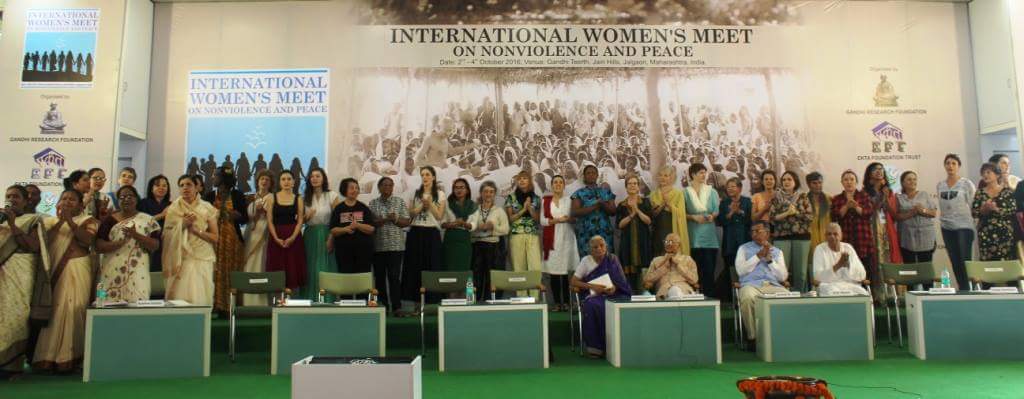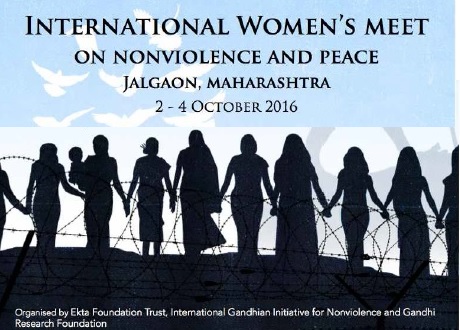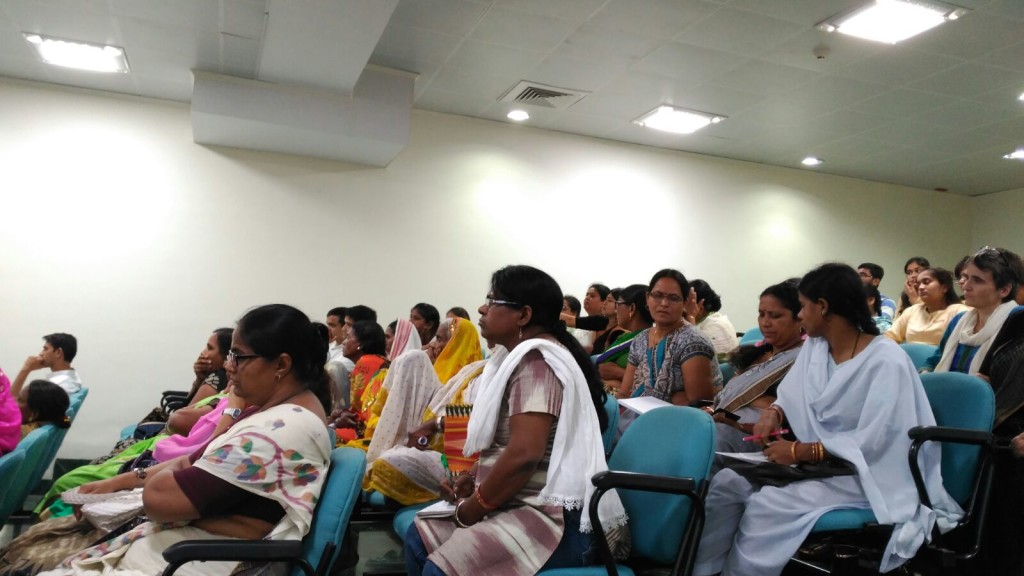Corina Fuks’ speech (SAIn) at the International Women´s Meet on Nonviolence and Peace, organized in India by Ekta Parishad.
BREAKING CHAINS AGAINST HUMAN TRAFFICKING
Good morning, everyone.
I am here on behalf of SAIN Political Party from Spain. SAIN is the Spanish acronym for Internationalist Self-management and Solidarity, and it is the principles behind the words that form the name of our party which have brought us to this International Women’s Conference on non-violent action.
First of all, we would like to express our deepest appreciation and thanks to the organisers of this event for inviting us to participate. It is an honour for us to be present here among those who are making the promotion of impoverished people real, who are working, against all odds, in order to make the world a fairer place for all people to live in.
Dear women and men, I have ten minutes to speak and during the next ten minutes, by the time I have finished, at least another 20 children will have been sold and bought in the world, some of them, mostly girls, will be used for commercial sexual exploitation or forced into marriage, some other children for domestic servitude, some for bonded labour, or for all of these evils together, or even to have their organs removed. This is called Human Trafficking and conservative figures say that an estimated 46 million people (2016 Global Slavery Index) are victims of modern-slavery across the world. 800,000 million people are trafficked across international borders every year; most of them experience physical violence and abuse. The profits generated by this horrendous business make trafficking in persons the second most lucrative crime in the world. It is estimated that more than 70% of these trafficked people are women and girls, and about 50% children.
Yet, these are just numbers, but behind these appalling figures, there are names, mothers, fathers, daughters, sisters, brothers, shattered lives and dreams…
-We are talking about Paula, who was sold into prostitution when she was 15 years old; now she is 18 and still lives in a brothel in Argentina.
-Camila, who is 11 and was sold for the first time into prostitution a couple of months ago to satisfy the demand during the last Olympic Games in Brazil.
-The trafficking of Nigerian women from Libya to Italy by boat is reaching “crisis” levels, with traffickers using migrant reception centres as holding pens for women, who are then collected and forced into prostitution across Europe. About 3,600 Nigerian women arrived by boat into Italy in the first six months of this year.
-In western Nepal, as many as 25,000 young girls are sold into indentured servitude for as little as 30 U$A. Known as Kamlaris, these girls are sold like cattle. They are physically, sexually, and emotionally abused.
-In the hilly forests of Jharkand, India, children as young as 10 are hammering flakes of rock off the mountainside. Others carry baskets of rocks to the top of the mine to sort through their contents to separate glittering fragments from the rock debris. These fragments are mica, the mineral that adds a shimmer to our make-up.
-Six-year-old Gharigbgol was forced to marry a 55-year-old man in exchange for a goat, rice, tea, oil and sugar, in Afghanistan.
-In Spain two children, both about 3 years old, were locked up in a house. They suffered from malnutrition and were given sedatives by their captors, who kept them captive to force their Nigerian mothers into prostitution in France.
-To help support her family, 26-year-old Jocelyn left her home town in the north of the Philippines to work as a domestic worker in Singapore. A week later, she landed in the hands of an abusive couple who frequently beat her. The three-month ordeal was made worse when she did not receive the promised monthly salary and was wrongfully accused of stealing. After being forced to sign a confession letter, she was detained at the Changi Prison for women.
-In 2015, Bangladesh export industry set a new export record, benefiting companies such as H&M, Mango, Primary, Gap, Walmart, but the human cost behind the bargains, and not always just bargain shopping, is slavery. Workers are exploited and forced to work endless hours for a meagre salary in an environment of harassment, violence and abuse, where not even the most basic guarantees of safety exist. We have Rana Plaza collapsed building that killed 1,246 people reminding us all up to which extent this is true.
I would like to mention that I am laying the emphasis of this talk mainly on women and girls because I deem it appropriate at an International Women’s Conference. However, this does not mean that slavery is limited to females. The greed for power and money also affects women’s fathers, sons, brothers, husbands, partners, male friends… They are also enslaved in the fish industry, in the textile one, in mines, in agriculture and construction, in brick kilns, namely in mainly every single primary and secondary sectors… and hideously, the number of boys forced into prostitution is also dramatically growing.
To date, the social, mental and physical consequences of human trafficking for victims have received woefully limited attention, particularly when compared with law-enforcement and immigration responses to trafficking. For people who are trafficked, health damage is often cumulative, making it necessary to take account of each stage of the trafficking process. At each stage, children, women, and men may encounter psychological, physical and/or sexual abuse; forced or coerced use of drugs or alcohol; social restrictions and emotional manipulation; economic exploitation, inescapable debts; and legal insecurities. Risks often persist even after a person is released from the trafficking situation, and only a small proportion of people reach post-trafficking services or receive any financial or other compensation.
Human trafficking, however, does not occur in isolation. It is part of an exploitative system, where capital rules over labour. Any person asked would agree that human trafficking is an outrageous crime. In almost every country, at least in theory, it is illegal, condemned and punished. Yet, it is essential to see that it is at the bottom of an oppressive system and that without legal speculation, unfair and dehumanizing migration policies and border controls that put these people in the hands of smugglers and traffickers, without unemployment, legal exploitation and the lack of workers’ rights, human trafficking would hardly exist.
 Exploitation and slavery exist because people’s work and their dignity are being crushed by an unfair system. Work produced by human beings and people themselves are considered mere commodities that can be bought and sold in the search of maximum profits. Human trafficking is caused and fed by financial mechanisms and the primacy of economics over politics, wars, border walls, restrictive migration policies, lack of fair laws, a mafia-run institutionalised system, and of course multinationals’ demand for cheap workforce along with our own demand for bargains or prostitution. Sadly enough, undoubtedly, also due to our indifference and inaction.
Exploitation and slavery exist because people’s work and their dignity are being crushed by an unfair system. Work produced by human beings and people themselves are considered mere commodities that can be bought and sold in the search of maximum profits. Human trafficking is caused and fed by financial mechanisms and the primacy of economics over politics, wars, border walls, restrictive migration policies, lack of fair laws, a mafia-run institutionalised system, and of course multinationals’ demand for cheap workforce along with our own demand for bargains or prostitution. Sadly enough, undoubtedly, also due to our indifference and inaction.On the other hand, at the beginning of this talk, I said that it is an honour for us to be here, sharing this event with people who are working to replace unfair political and economic structures by a just and non-violent system. Here, there are representatives of just a few organizations, but there are other hundreds of associations worldwide which are on the go.
In every country where there are victims of trafficking, there are also associated people raising awareness, denouncing injustice, assisting victims, getting organised to exert pressure to pass and change laws to put an end to modern slavery and exploitation. I can mention: La Alameda association in Argentina; Shakti Samuha, a group of former Nepali sex slaves freeing women and girls from trafficking in India and China; in Spain, the Christian Cultural Movement has been denouncing child slavery for decades, as well as an Inter-ecclesiastical Group and a Network of associations that are working against human trafficking and assisting victims; in Mexico, the Human and Labour Rights Commission of Tehuacán; the Bonded Labour Liberation Front, in Pakistan; The Congregation of the Sacred Heart of Jesus, in Nigeria; Attawasol, an association of working women, in Morocco; only to mention a few. Being in India, I cannot fail to mention Apne Aap Women Worldwide, founded by Ruchira Gupta with twenty-two women from Mumbai’s red light district. These women have passed away from hunger, suicide, and AIDS-related complications, but their work and vision of a world without slavery still continues today, reaching over 21,000 women and girls.
We are all drops of water in an ocean, moving to change the tide, and dear friends, the tide is changing. Our revolution is for peace, for freedom, for a sustainable world where there be no hunger, no slavery and no exploitation; and even though we know we will not meet these goals, we are initiating processes that can engage others to do actions together, to march together and, by walking, to get closer and closer to the goals and, by walking, to pave the path to reach them some day for our future generations.

